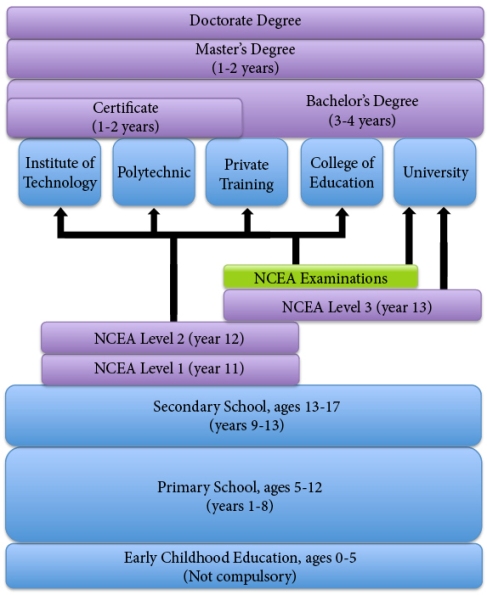Starting in upper secondary school, students in New Zealand may choose to specialize in vocational education, or choose to pursue a combined program of vocational and general classes. Many upper secondary schools have a bridge program with tertiary vocational education providers, allowing students to transition smoothly into professional training upon completion of secondary school. Students who focus on their vocational education in secondary school generally go on to attend an Institute of Technology or Polytechnic; the full-time degree students receive there is considered on par with a university degree. Alternately, students may choose to pursue vocational education at a private institution.
In order to ensure uniformity of coursework, New Zealand also has a National Qualifications Framework (NZQF). Upon graduation, students in New Zealand earn a National Certificate of Educational Achievement, as well as qualifications for a number of skilled trades. Training programs can apply to have their qualifications certified and listed by the NZQF, and the list of certified qualifications are publicly available, providing a service to both students seeking to enhance their skills and employers seeking to understand potential employees’ competence levels. Certified qualifications must meet the frameworks established by the NZQF. Both employers and higher education institutions recognize these qualifications. Education and training institutions are authorized to provide them. Students seek them with the confidence that, once achieved, they will be honored by employers and other educational and training institutions. New Zealand has made a massive investment in this system, not least in the development of high quality assessments for the full range of qualifications. There is every reason to believe that this system of qualifications, built as it was on a solid prior foundation of high quality standards and assessments, has a powerful and positive influence on quality of instruction in New Zealand high schools and the incentives of students to take tough courses and work hard in school, no matter what they plan to do with their lives.
(Source: Center on International Education Benchmarking: http://www.ncee.org/programs-affiliates/center-on-international-education-benchmarking/top-performing-countries. 2012. Washington D.C.)

